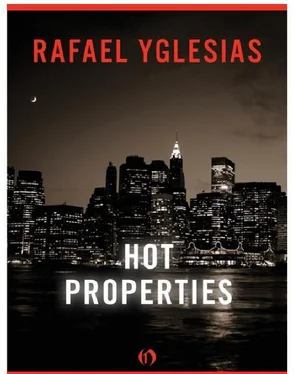Fred needed an ashtray. There wasn’t one nearby. He didn’t want to break off to find one. “Bart, I … are you saying that I’m stuck with Bob — I mean, I like Bob, but—”
“Of course not. You’re a very talented writer. Once this book is on the list, I’m sure the tennis novel will be great, then we can make our move. Collect a million up front. Maybe more. Come on, Fred. Right now you should be thinking of organizing things so you can handle this money, and getting ready for the book tour.” There was the harsh noise of his intercom. Fred heard his secretary’s voice in the background: “Bob Holder on two.”
“Well, speak of the devil. It’s Bob on the line. Do you want to hold? Or should I call you back?”
“No, you can call me back,” Fred answered in a desultory tone. The long ash from his cigarette fell and smashed itself against his pants leg, disintegrating in graceful silence.
“Cheer up, Fred! You’re rich and you’re going to be famous,” Bart said, and hung up.
Fred stood with the phone in his hand. The cigarette’s ember was burning into the filter, the red glow shrinking into a shell like a frightened turtle. “Fuck you,” he said to the dead phone.
Patty spent an uneasy night in the loft. The streets of SoHo — its buildings painted in neon pastels, mobbed by tourists and flea markets — at night reverted to their past: dark warehouse alleys, their wobbly humpbacked gutters glistening with puddles, the occasional drunken voice echoing in the cast-iron tunnels. To be sure, she knew there were expensive restaurants within a block or two — if she looked out the window long enough, the long dark bodies of the limos would pass: restless city sharks on the prowl. But walking in giant space, sensing her small body alone under the high ceiling, was creepy. She kept the television on for company. Gelb had phoned twice. He had told his wife he wanted a divorce, denying there was another woman involved.
“Good,” Patty had said. “Because there isn’t.”
“You’ve changed your mind again.”
“I didn’t promise anything. You bullied me. I need time to think. I don’t want to see you and get confused.”
He acted as though she didn’t mean it. Called back to say so point-blank. She wanted to ask him why he wasn’t doing anything for her book, but she feared he would think he could buy her body with an ad budget — and she knew now that wasn’t true. She could tell him it would, but she would never keep the bargain. Not because of principle, because of vanity. She didn’t want to succeed as a writer that way— she wanted the accomplishment to be real, to fill her with confidence, not turn into the mush everything else in life had become: every relationship compromised, every achievement diluted. She had always gotten by through the goodwill of men, or friends, or her winning manner. The novel was stripped of these advantages, naked but for her mind and will and talent. The reader could only be seduced by those beauties — her tits, her wondering eyes, her smooth skin would make no difference. The politics of feminism were meaningless to her; its abstractions plastic weapons when in combat with the real world, but this understanding of it, that at last there was something of her own to protect, not simply ideas, was a flag to rally under. No matter how hard or scary, with her novel she was going to do without the men, without the coy plea of helplessness. She had given up the illusion that she could change her dealings with men about sex or love — but about her work, yes. If Gelb didn’t want to advertise her book because it was good, then let it not sell. If she needed him, it would be because of sexual weakness, not the fear of poverty or obscurity.
Earlier that day she demanded the truth from Betty about her novel’s future, now only a month from publication. Unfortunately. Betty answered her: her book had a ten-thousand-copy printing, but there would be only one shared ad in the Times Book Review, and without a book club, unless the reviews were sensational, a paperback sale was unlikely. “People like it,” Betty said sadly. “But they feel it’s a quiet book, too similar to so many others that have come out to be a big seller.”
“You mean it’s not thrilling like Fred Tatter’s book?”
“Right now Fred’s book is controversial — it wouldn’t have been fifty years ago. It’s totally retro — it says men are biologically unfaithful. Just harmless hormones, not sexism. People want to hear that, even just to get angry at it. I hear some of the feminists like it because they think it shows that men are still disgusting. They say: we can use this as something to attack. That’s why all the talk shows want him. He’s getting on the Phil Donahue show ’cause Sara Farleigh wants to be on with him and tear him to shreds. He’ll be humiliated but his novel will sell thousands.”
“Not a bad bargain.” Patty said.
“I think it is,” Betty said, frowning. “Sure Fred’ll make money, but he’ll feel like a piece of shit.”
“No.” Patty shook her head. “His book will be read. That’s really all that matters to a writer.”
“Oh!” Betty sat up, an impatient governess. “That’s disgusting. Don’t say it.”
“You’re not a writer. Betty,” Patty said. Her friend looked startled at Patty’s tone and demeanor: a trace of pity, of condescension. “You can’t understand. They may yell and scream at him, but they’re paying attention. That’s all that matters.”
“You make writing sound like it’s being a spoiled brat.”
“Maybe it is.”
Betty looked at her for a while, solemnly. “You’re upset about your novel. I understand.”
“No, you don’t. I’m not. I was lucky to get it published. If it weren’t for you, it wouldn’t have been.”
“That’s not true — it’s a terrific book.”
“Thanks. But the next time I’ll submit my manuscript to strangers — then even the failures will feel good.”
Betty no more believed this termination of their work relationship than Gelb accepted the end of their sexual one. Betty changed subjects nervously, asking how things with David were going, implying it was failed romance that had put Patty in such a bad mood. Betty immediately offered to put her up while Tony was away. These favors she would accept. But David’s sudden — and bizarre — trip had left her in limbo, wandering in a neighborhood half-changed with her life half-altered.
The phone rang. Gelb again, she thought, reaching for it wearily. She almost didn’t pick it up. “Patty?” Betty was breathless. “I just got off the phone with Paula Kramer. She called to ask my feelings about Garlands publishing Fred’s novel …”
Patty closed her eyes in despair, hearing Fred’s name mentioned again.
“… I couldn’t say anything— except I talked about your novel. Said that was the sort of thing I felt analyzed modern relationships in a way I understood them. She got quite excited about the contrast between your novel and his — you know, given the hook that you’re both at the same house, both first novels, both being published the same month. She wants to interview you. I gave her your number. There’s a possibility she’ll include you in the piece she’s doing for the Times on young novelists.”
“That’s great,” Patty said, unsure it was. Paula Kramer worried her. Her pieces, even when flattering, had an edge of smart-ass condescension that Patty enjoyed only when it was about people she disliked. “Has she read my book?”
“Read it? She’d never heard of it until I told her about it. I’m pretty proud of myself. I really did a selling job.”
She wants to be thanked again. Oh thank you thank you for helping sweet little me. Gelb was the same. When he had shown her the bookjacket cover, he boasted: “I insisted they hire Golum, best cover man in the business. Cost an extra five hundred.” She tried to forgive Betty for doing it — hers was the self-praise of insecurity; his, an itemized bill. “That’s great, Betty. Thank you.”
Читать дальше












